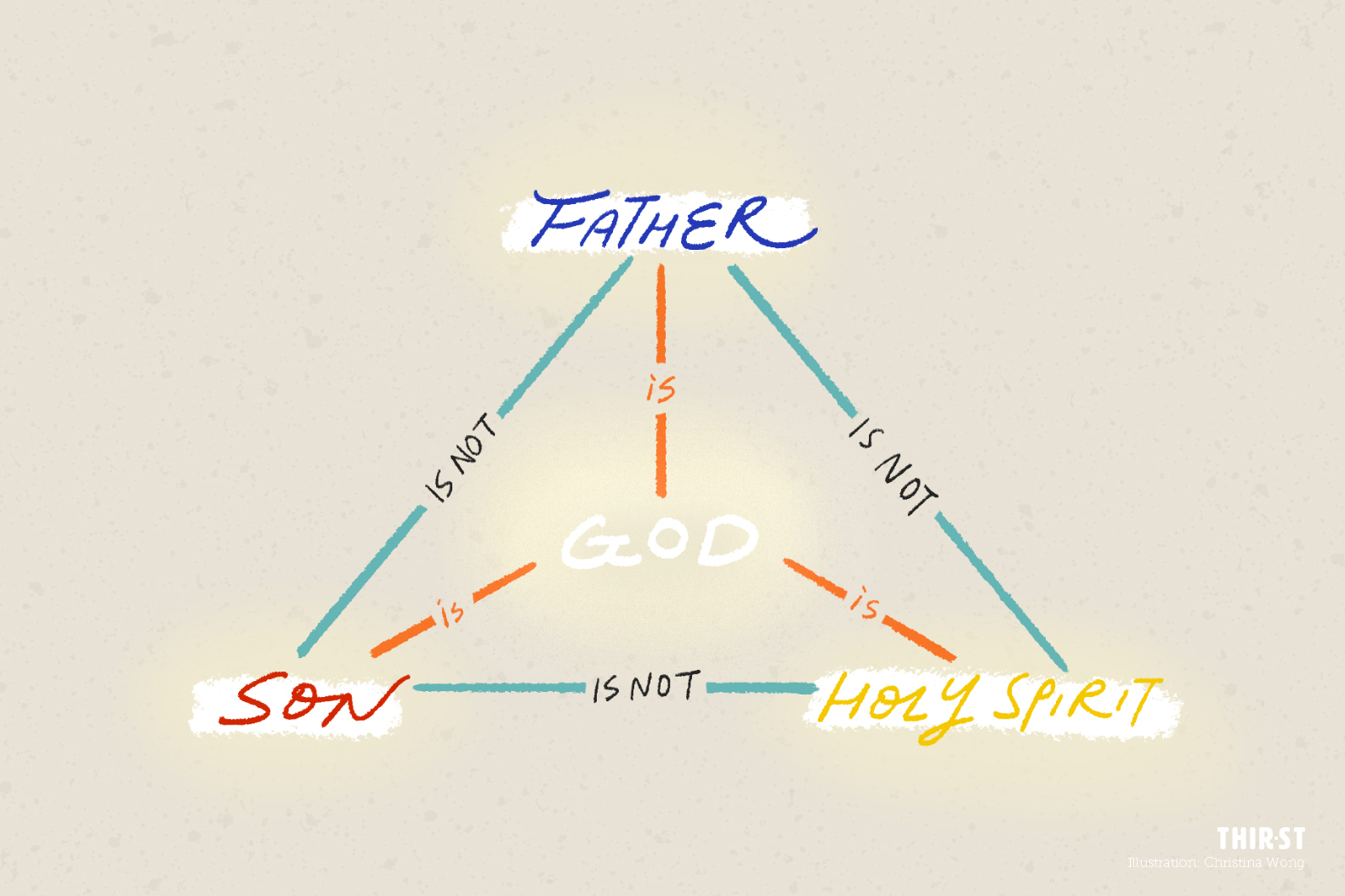“Why three persons and not two?”
This question came up at lunch one day when my friend and I talked about the triune, eternal nature of God as three distinct persons – Father, Son and Holy Spirit.
You might have heard the Trinity illustrated with the three states that water can exist in – liquid water, gaseous steam or solid ice. But this illustration isn’t quite accurate because it doesn’t reflect the co-equal, three-in-one nature of God.

The Trinity is simultaneously three distinct persons, each being fully God.
We do know that the Bible speaks of the Father as God (Philippians 1:2), Jesus as God (2 Peter 1:1) and the Holy Spirit as God (Acts 5:3-4). The Trinity is God.
Does it have any bearing on our lives, though?
TRINITY MEANS RELATIONSHIP
“We tend to acknowledge the doctrine (of the Trinity) with a polite hospitality, but not welcome it with any special warmth,” writes theologian Fred Sanders in his book, The Deep Things of God: How the Trinity Changes Everything.
But would that be different if we saw the Trinity as a representation of love?
“A solitary god cannot be love… he cannot in himself be love, since love requires an object. Real love requires relationship,” author Jared Wilson says.
“From eternity past, the Father and the Son and the Spirit have been in community, in relationship. They have loved each other. That loving relationship is bound up in the very nature of God himself.”
Real love requires relationship.
There was no deficiency in God that He needed to create beings to adore Him; the Trinity was well-sufficient in their perichoresis – the self-giving love between Father, Son and Spirit.
“The good news of salvation is ultimately that God opens his Trinitarian life to us,” Sanders says.
God graciously takes us into the fellowship of the Father, Son and the Holy Spirit.
“This is how God saves us – by sending his Son and Spirit (Galatians 4:4-7). Our salvation hangs on these two sendings. Without them, God would still be a Father, but he wouldn’t be our Father. He would still have a Son, but he wouldn’t have many sons,” describes pastor Justin Dillehay.
WHAT DOES THIS MEAN FOR CHRISTIAN LIVING?
At a recent talk on Trinitarian Ethics hosted by the ETHOS Institute, Bishop Emeritus Robert Solomon pointed out that our understanding of the Trinity is essential for how we live and understand discipleship.
The Son of God paid the penalty for our sin and shows us how to live the moral life, while the Spirit of God provides us with the power to live such a life, so that we’re transformed into His image more and more (2 Corinthians 3:18).
The moral life must be marked by right relationships with God and with our fellow man, says Dr Solomon.
“Love the Lord your God with all your heart and with all your soul and with all your mind and with all your strength.’ The second is this: ‘Love your neighbour as yourself.’ There is no commandment greater than these.” (Mark 12:30-31)
Here are three areas of our life that we can pay attention to:
1. Developing our conscience
The Father is the source of the moral law – when we look at the Father, we understand the nature of the law.
“Conscience is that knowledge or consciousness by which man knows that he is conforming to moral law or the will of God,” says Dr Solomon, quoting from theologian Ole Hallesby.
Take effort to develop a right relationship with God; neither licentiousness (living without heed of God’s laws) nor moralism (behaviour modification without transformation of character) is the way, explains Dr Solomon.
Our conscience needs to be redeemed by the grace of God, educated by the word of God and enlivened by the Spirit of God, thus enabling us to relate with God and understand His holy character and righteous purpose.
Without a redeemed, turned-toward-God conscience, we’ll also find it hard to live out Micah 6:8:
“He has shown you, O mortal, what is good. And what does the Lord require of you? To act justly and to love mercy and to walk humbly with your God.”
If we neglect our conscience, we won’t know just how bad we are, and we won’t be able to walk humbly with God, act justly and love mercy.
2. Growing in Christlikeness
God’s character is revealed in the person of Jesus Christ.
He not only died for our sins to bring us back into relationship with God; He’s also the perfect example we’re supposed to imitate.
When we become like Christ, we become the moral persons God intended us to be.
But for us to become like Christ, we need to keep our eyes fixed on Jesus and study the way He lived.
3. Living by the Spirit
We must also realise that the moral life cannot be lived in our own strength or cleverness. Bible teacher Warren Wiersbe says this: “The power of the Spirit is not luxury, it is a necessity.”
Without the help of the Holy Spirit, it’s not possible for man to become holy.
Our job is not to produce fruit but to remain in Christ.
The Holy Spirit does His sanctifying work in us so that we’re transformed, so that the ugliness of our “old self” is removed (Ephesians 4:22-24). And over time – a lifetime – we become who we’re intended to be, a reflection of his splendour.
Character is a product of God’s work in our souls. As we let Him work in us, He leaves a personal imprint of Him in us. That becomes our character.
The Spirit-filled life is achieved through three experiences on our part: Surrender, obedience and the bearing of spiritual fruit. Our job is not to produce fruit but to remain in Christ – the Spirit is the one who helps us bear fruit.
Surrendering to God is not a passive process. As God operates, we’re called to cooperate with Him.
“If I can learn every moment of the day to depend upon God, everything will come right. You will get the higher life if you depend absolutely upon God.” – Andrew Murray
- What is your understanding of the Trinity?
- What is your relationship with each of the three persons of the Trinity?
- What does being in a right relationship with God and our fellow man look like?









